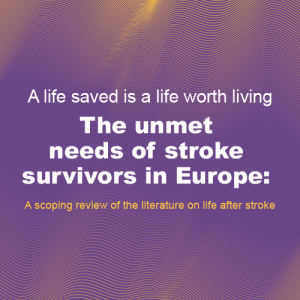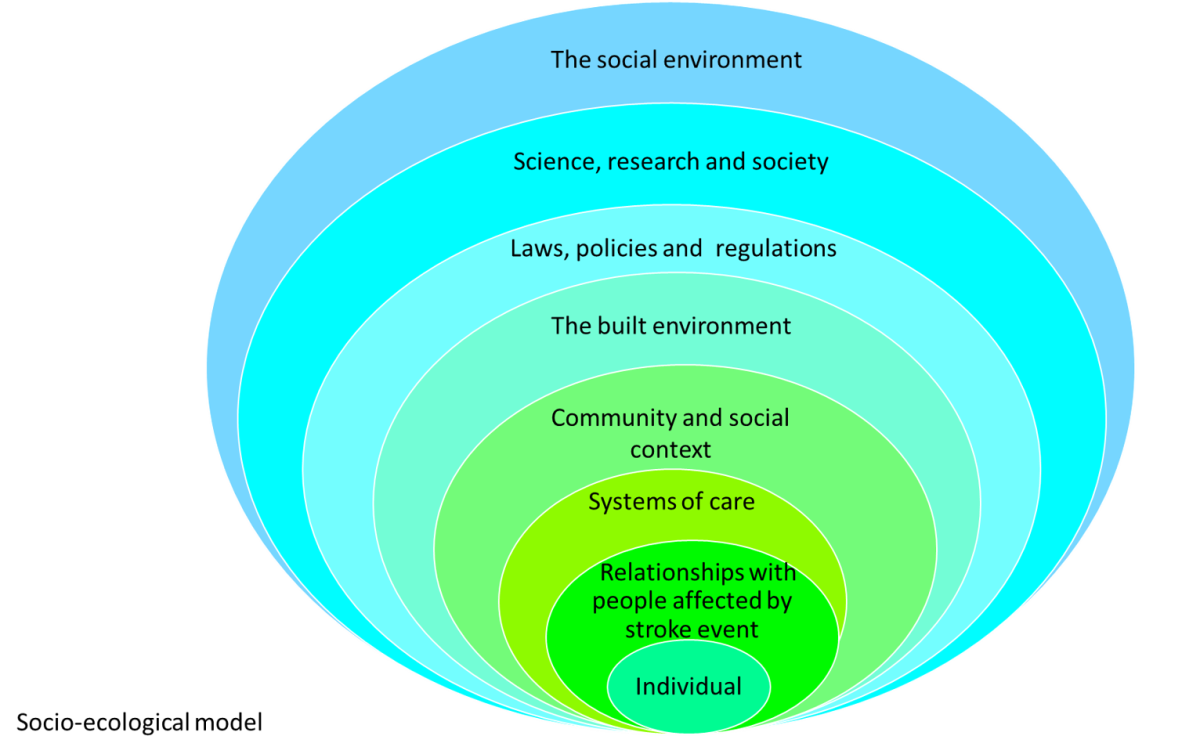Literature review of unmet needs of stroke survivors reveals huge gaps in evidence

A new report A life saved is a life worth living – the unmet needs of stroke survivors in Europe, is launched at the European Life After Stroke Forum on Friday 10 March 2023, revealing the unmet needs of stroke survivors and huge gaps in evidence.
We commissioned King’s College London, to undertake a comprehensive literature search into the needs and unmet needs of stroke survivors in Europe.
For the report, the researchers developed an eight-level socio-ecological model based on The World Health Organisation’s International Classification of Functioning, Disability and Health (ICF) Core Set for Stroke and used this as a guide to identify and synthesize the literature on needs and unmet needs and to present our findings.
 With the exception of the Body Function domain, the report authors found relatively little evidence on needs. Research reporting on the levels of the socio-ecological model covering issues not related to the individual were also sparse. This bias reflects the clinical practice and research interests of healthcare professionals, or the disciplinary backgrounds of researchers conventionally funded in stroke research. In addition to this bias, there is still a severe lack of studies that aim to provide estimates of stroke-related disability, functioning and health trends in adults living with stroke in Europe. And while there is a considerable amount of literature on self-reported unmet needs, there is inconsistency and sometimes a lack of clarity in how needs are categorised and reported across these studies.
With the exception of the Body Function domain, the report authors found relatively little evidence on needs. Research reporting on the levels of the socio-ecological model covering issues not related to the individual were also sparse. This bias reflects the clinical practice and research interests of healthcare professionals, or the disciplinary backgrounds of researchers conventionally funded in stroke research. In addition to this bias, there is still a severe lack of studies that aim to provide estimates of stroke-related disability, functioning and health trends in adults living with stroke in Europe. And while there is a considerable amount of literature on self-reported unmet needs, there is inconsistency and sometimes a lack of clarity in how needs are categorised and reported across these studies.
There is an urgent need for more research, especially covering the environmental, activities and participation domains, if the Stroke Action Plan’s section on Life After Stroke is to be implemented.
The report also highlights the lack of research onto possible interventions to meet or alleviate the unmet needs of stroke survivors and their carers. Research questions relating to psychological/emotional health, cognitive function, communication and fatigue have been identified as top research priorities by consensus-based priority setting exercises such as those conducted for the European Stroke Action Plan and UK Stroke Association/James Lind Alliance Priority Setting Partnership (involving stroke survivors, carers, health and social care professionals) stroke.org.uk/research/priority-setting-partnership
There are evidence gaps relevant to identifying and managing those with stroke who are at risk of suicide: strategies to identify suicidal ideation, particularly in people who do not meet clinical criteria for depression, and effective interventions. This topic is not generally mentioned among research priorities. This review cites evidence that stroke survivors’ risk of suicide attempt and death by suicide is around twice that of the general population, so there is an obvious need for action to prevent this loss of life and repercussions.
Priorities for research into interventions to benefit carers should also be clarified.
This review backs up the European Stroke Action Plan when it raises gaps in evidence across the post-acute stroke care pathway, including in community-based rehabilitation (restoring body functions and enhancing participation in activities/community life), regular reviews of health and social needs, and secondary prevention. Secondary prevention information and services are among the most reported unmet needs, after rehabilitation. Gaps in ongoing secondary prevention care have been identified across Europe, including lifestyle management programmes, access to some medications which help to control clinical risk factors, and face to face follow up in hospital or in primary care.
The European Stroke Action Plan highlights important contributing factors to gaps in care including a lack of robust data on longer term stroke management/care, and the associated problem of a lack of reference to life after stroke in national guidelines. The evidence presented in this report underscores the need to implement existing evidence-based guidelines and identify models of best practice which can be applied in (other) European countries.
Methods-section-A-life-saved-is-a-life-worth-living
References-by-section-A-life-saved-is-a-life-worth-living
The full report will be published later in the year.




